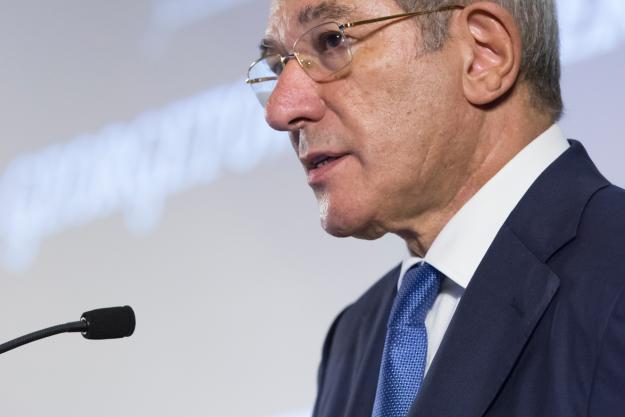
Ambassador Ahmet Üzümcü, giving a speech at Georgetown University in Qatar. Photo credit: Georgetown University in Qatar
The Director-General of the Organisation for the Prohibition of Chemical Weapons (OPCW), Ambassador Ahmet Üzümcü, shared with Georgetown University students the necessity of on-going efforts and vigilance in upholding the global ban on chemical weapons through his talk “Chemical Weapons Abolition: 20 Years On”, during his trip to Qatar from 22 to 25 October.
“Despite the existence of one of the most successful disarmament treaties ever, the violation of the Chemical Weapons Convention’s fundamental prohibitions is a matter of serious concern. This means that our work is far from over. Getting the world to agree on a norm requires hard work; to make that norm truly universal and enduring is even more challenging,” Ambassador Üzümcü emphasised. The speech also covered the OPCW’s larger mandate to enhance universal understanding of international non-proliferation norms and potential threats facing the Convention, both present and future.
The Director-General opened the OPCW and the State of Qatar’s Training Course for National Authorities of States Parties to the Chemical Weapons Convention (CWC) on Training Escorts for Inspections, which took place in Doha from 23 to 25 October. The course, under the auspices of the Doha Regional Centre for CBRN Training, is tailored for training personnel who perform the role of national escorts during OPCW inspections. It involves practical exercises such as identifying declarable chemical industry activities, pre- and post-inspection activities, and mock industry inspections.
Ambassador Üzümcü met with the Chairman of the National Committee for the Prohibition of Weapons, H.E. Major General Staff Nasser Mohamed Al-Ali; Secretary General Ministry of Foreign Affairs, H.E. Dr. Ahmed bin Hassan Al Hammadi; and Assistant Minister of State for Defence Affairs, Major General (Pilot) Abdulla Jamman Al-Hamad; and discussed the current issues on the OPCW’s agenda.
Background
Qatar joined the Chemical Weapons Convention in 1997. It actively engages with and supports OPCW activities, including those that build national and regional capacity through the OPCW’s international cooperation and assistance programmes.
Qatar successfully operates the Doha Centre for Regional CRBN Training.
The Chemical Weapons Convention comprehensively prohibits the use, development, production, storage and transfer of chemical weapons. Any chemical used for warfare is considered a chemical weapon by the Convention. The OPCW is the implementing body for the Chemical Weapons Convention and oversees the global endeavour to permanently eliminate chemical weapons.
The Convention entered into force in 1997. With 192 countries obligating themselves to the CWC, it is the most successful disarmament treaty eliminating an entire class of weapons of mass destruction. To date, over 93 per cent of all chemical weapon stockpiles declared by possessor states have been destroyed under OPCW verification. For its extensive efforts in eliminating chemical weapons, the OPCW received the 2013 Nobel Prize for Peace.
More information
- OPCW Fact Sheets
- Opening Remarks by Director-General OPCW, Ahmet Üzümcü “Training Course for National Authorities of States Parties to the Chemical Weapons Convention on Training Escorts for Inspections” Doha Regional Centre for CBRN Training Doha, Qatar
- “Abolishing Chemical Weapons: 20 Years On” Lecture by Director-General Ambassador Ahmet Üzümcü At Georgetown University’s School of Foreign Service in Qatar 23 October 2016
